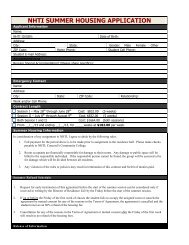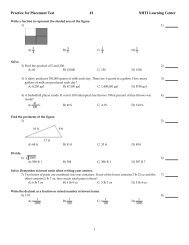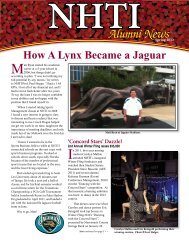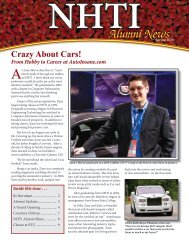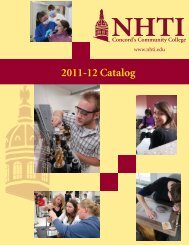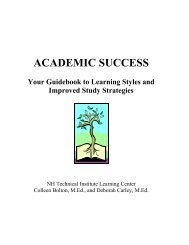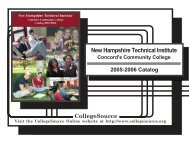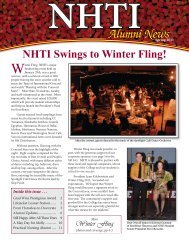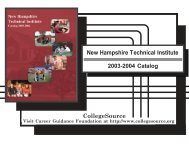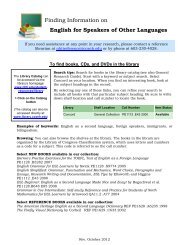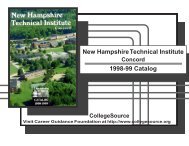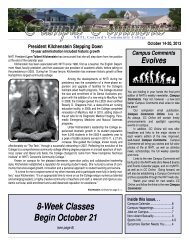Course Descriptions 11-12 - NHTI - Concord's Community College
Course Descriptions 11-12 - NHTI - Concord's Community College
Course Descriptions 11-12 - NHTI - Concord's Community College
- No tags were found...
You also want an ePaper? Increase the reach of your titles
YUMPU automatically turns print PDFs into web optimized ePapers that Google loves.
assessment, treatment planning, counseling, casemanagement, crisis intervention, client education, referral,record keeping and consultation. (Prerequisites: AD <strong>12</strong>0, AD205, HU <strong>11</strong>1, MH 187, PY 105, PY 220 and PY 283, with acombined major field GPA of 2.0)AD 295 Internship II: Orientation to Addictive BehaviorsCounseling* 2-<strong>12</strong>-6The second internship experience offers 30 hours ofclassroom-based group clinical in support of 180 hours offield work in an approved clinical setting. The studentassumes increased responsibility culminating in substantialuse of the fundamental skills of screening, intake,orientation, assessment, treatment planning, counseling,case management, crisis intervention, client education,referral, record keeping and consultation in direct contactwith clients/patients. A greater understanding of availabletreatment resources is accomplished via an inspection of thestate-wide continuum-of-care. (Prerequisite: AD 294)AD 296 Addiction Practicum I* 2-8-4The first internship experience offers 30 hours of classroombasedgroup clinical supervision in support of <strong>12</strong>5 hours offieldwork in an approved clinical setting. The student initiallylearns to integrate into an agency atmosphere within whichthey may research, observe, role-play and practice thefundamental skills of screening, intake, orientation,assessment, treatment planning, counseling, casemanagement, crisis intervention, client education, referral,record keeping and consultation. (Prerequisites: AD <strong>12</strong>0, AD205, HU <strong>11</strong>1, MH 187, PY 105 and PY 283, with a combinedmajor field GPA of 2.0; PY 220 may be taken as a pre-orcorequisite)AD 297 Addiction Practicum II* 2-8-4The second internship experience offers 30 hours ofclassroom-based group clinical supervision in support of <strong>12</strong>5hours of fieldwork in an approved clinical setting. Thestudent assumes increased responsibility culminating insubstantial use of the fundamental skills of screening, intake,orientation, assessment, treatment planning, counseling,case management, crisis intervention, client education,referral, record keeping and consultation in direct contactwith clients/patients. A greater understanding of availabletreatment resources is accomplished via an inspection of thestate-wide continuum-of-care. (Prerequisite: AD 296)* The student will also complete an interview with thepracticum coordinator the semester prior to the firstscheduled practicum. Special requests regarding practicumentrance may be brought to the department head by thestudent. Review of the requests will be made by thedepartment faculty and special exemptions may be madefor entrance into the practicum.AnthropologyAN 101 Introduction to Cultural Anthropology 3-0-3This course is an introduction to the perspectives, methods,and ideas of cultural anthropology and will analyze humandiversity and similarities among people throughout theworld, both western and non-western, through cross-culturalcomparison. Topics include: culture and society;ethnographic research; ethnocentrism and culturalrelativism; how societies adapt to their environment;different forms of marriage and social relationships; male,female and other forms of gender; the social functions ofreligion; and the processes of social-cultural change.AN 210 Native American Studies I 3-0-3A study of North American Indian cultures from the lithicperiod to the 21st century. Origin of Native Americancivilization and development will be studied, including:lifeways, religion, ceremonies, arts and social organizations.The course will first focus on Mesoamerica during the pre-Columbian period. The study then proceeds to an in-depthreview of the people/tribes of the Northeastern andsoutheastern woodlands and the Great Plains cultural area.Animation and Graphic GameProgrammingIn addition to listed prerequisites, students must earngrades of "C-" or higher in each major course to progress inthe program.AG 101 Introduction to Game Design and Creation withProgramming 2-3-3This course will focus on two major aspects of computergaming. The first focus will be the overview of games andtheir development. Career paths in the entertainment fieldwill be reviewed. Critical criteria for gaming success will beresearched. Game design concepts to be covered include thehistory of game programming, game psychology, andcreating a game design outline. The second focus will be thehands on development of games, with all their majorfeatures incorporated, using a scripting language, such asavailable in Adobe Flash. (Co-requisite: CP 107 or permissionof instructor based on basic programming skills and aworking knowledge of Windows operating system) A gradeof C- or higher must be achieved to meet the prerequisitecriteria for subsequent major field courses.AG <strong>11</strong>0 Math and Physics for Game Programmers 2-3-3Math and physics play key roles in game programming.Effective use of math is needed for code design, datastructures utilization, using design patterns, developingartificial intelligence (AI), using scripting engines, controlling3D pipelines and texture mapping development. Math is alsoneeded to implement the physics utilized in Newton's lawsand concepts of collisions and reactions. Programmedapplications which use math and physics in gamedevelopment will form the foundation for this hands oncourse. (Prerequisites: AG 101 and MT <strong>12</strong>4 or MT 133 or withpermission of instructor. Alternatively, students may havecompleted or are taking at the same time higher level mathcourses which are MT 134 or MT 205 and have taken AG101)AG <strong>12</strong>0 Advanced Topics in C# and C++ 2-3-3Object Oriented Programming (OOP) and its effective designwill be the major focus of this course. Encapsulation,inheritance and polymorphism are the key components of8/17/20<strong>11</strong> <strong>NHTI</strong>, Concord’s <strong>Community</strong> <strong>College</strong> <strong>Course</strong> <strong>Descriptions</strong> 20<strong>11</strong>-20<strong>12</strong> 2



